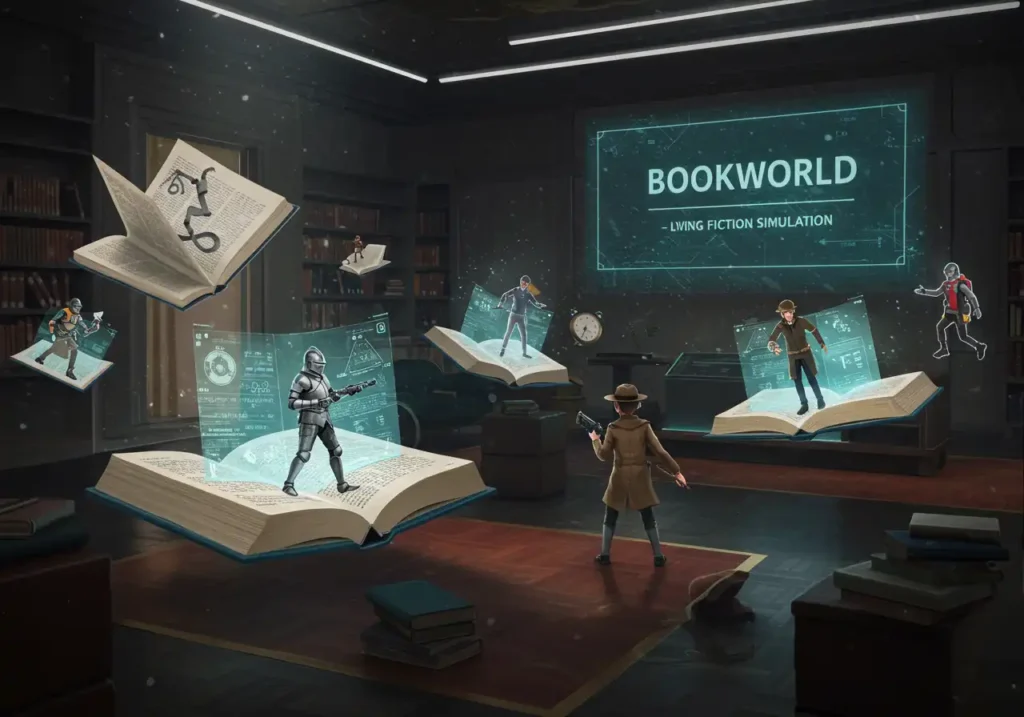What if your favorite characters from a novel didn’t just live on the page—but interacted, evolved, and created new adventures on their own? Welcome to BookWorld, a breakthrough concept in artificial intelligence that uses multi-agent models to simulate living fictional universes. This emerging field combines creative writing, AI technology, and world simulation to redefine how stories are told, expanded, and experienced.
In 2025, as AI continues to evolve from text generation to dynamic world-building, BookWorld stands as a glimpse into the future of storytelling—where readers don’t just read books; they explore them.
What Exactly Is BookWorld?
 BookWorld is a conceptual AI framework built on multi-agent systems—AI programs designed to represent individual characters or entities that interact within a simulated world. Each agent possesses a unique personality, set of memories, motivations, and goals. Together, they create a self-sustaining environment that can continue the story even after the book ends.
BookWorld is a conceptual AI framework built on multi-agent systems—AI programs designed to represent individual characters or entities that interact within a simulated world. Each agent possesses a unique personality, set of memories, motivations, and goals. Together, they create a self-sustaining environment that can continue the story even after the book ends.
Think of it as a living digital ecosystem for literature. Instead of static stories, BookWorld can generate ongoing narratives that align with the author’s style, plot logic, and world rules. It’s storytelling that never stops evolving.
According to early research, systems like BookWorld rely on advanced language models trained to understand context, tone, and continuity, ensuring that generated dialogue and actions feel authentic and emotionally resonant. (arxiv.org)
How It Works: The Technology Behind BookWorld
The BookWorld concept uses three key AI components:
- Agent Modeling: Each character is represented as a semi-autonomous AI with memory, emotional state, and communication ability. Agents can make choices, form relationships, and influence story outcomes.
- World Simulation Engine: The environment—such as kingdoms, cities, or fantasy realms—is built as an evolving digital world with time, geography, and social dynamics.
- Language Model Integration: A fine-tuned large language model governs narrative tone, ensuring that dialogue and actions remain faithful to the story’s original voice and genre.
Unlike traditional interactive fiction, BookWorld doesn’t rely on branching scripts. Instead, it uses emergent behavior, meaning the story unfolds dynamically based on the agents’ decisions—similar to real-world social interactions.
Why BookWorld Matters for Storytelling
BookWorld could be one of the most important innovations in narrative media since the invention of the eBook. Here’s why:
- Expanding Literary Universes: Classic and modern novels could continue indefinitely, creating new storylines while preserving the original author’s vision.
- Interactive Reading: Readers might soon explore worlds in real time, conversing with characters or witnessing new events unfold spontaneously.
- Author Collaboration: Writers could use AI simulations to brainstorm plotlines, test character interactions, or visualize story outcomes before publishing.
- Education & Creativity: Teachers and students could engage with literary classics through simulated conversations, deepening understanding of themes and motivations.
This approach could redefine books as living experiences—bridging the gap between literature, gaming, and artificial intelligence.
Challenges and Ethical Considerations
While the concept of BookWorld is exciting, it raises important ethical and creative questions:
- Author Rights: If an AI expands or simulates a copyrighted work, who owns the new material—the AI developer, the author, or the reader?
- Bias and Representation: AI systems trained on biased data may perpetuate stereotypes within generated stories.
- Authenticity: Can AI truly replicate an author’s “voice,” or does it dilute the human art of storytelling?
- Emotional Impact: Characters that act autonomously might diverge from their intended personalities, changing how audiences perceive them.
Developers and literary professionals are already discussing frameworks to protect creative rights while enabling innovation. The goal is to empower storytelling—not replace storytellers.
Opportunities for Authors and Platforms
For authors, BookWorld represents a new creative frontier. It could allow them to:
- Extend their fictional universes without writing every scene manually.
- Let readers explore “what-if” storylines without contradicting the canon.
- License AI experiences as companion content to their books, increasing engagement and revenue.
For platforms like Bookzee, integrating AI world simulations could become the next big leap in reading technology. Imagine a “dynamic fiction” category where stories evolve based on collective reader interaction. It would transform how readers discover, discuss, and experience stories.
How BookWorld Could Transform Reader Engagement
Readers crave immersion—and BookWorld could deliver it in unprecedented ways:
- Living Worlds: Characters continue evolving even when readers stop reading, creating a sense of continuity.
- Personalized Experiences: Every reader might encounter unique storylines shaped by their interactions.
- Community-Driven Lore: Shared AI worlds could allow readers to collectively expand lore, similar to multiplayer fiction universes.
As BookWorld-like technologies mature, the line between “reader” and “participant” may blur entirely—turning passive reading into an ongoing dialogue between human creativity and machine imagination.
The Future of Fiction and Artificial Intelligence
 BookWorld represents a broader movement toward AI-enhanced creativity. We’re witnessing a world where language models become co-authors, virtual agents become actors, and readers become explorers.
BookWorld represents a broader movement toward AI-enhanced creativity. We’re witnessing a world where language models become co-authors, virtual agents become actors, and readers become explorers.
While still experimental, the potential is enormous. As one researcher noted, “AI doesn’t replace authors—it gives them infinite canvases.” The future of fiction might not fit between two covers anymore. It could live, grow, and adapt as long as the readers do.
For the publishing world, this means preparing for new business models, collaborative storytelling formats, and ethical guidelines that keep creativity at the center.
